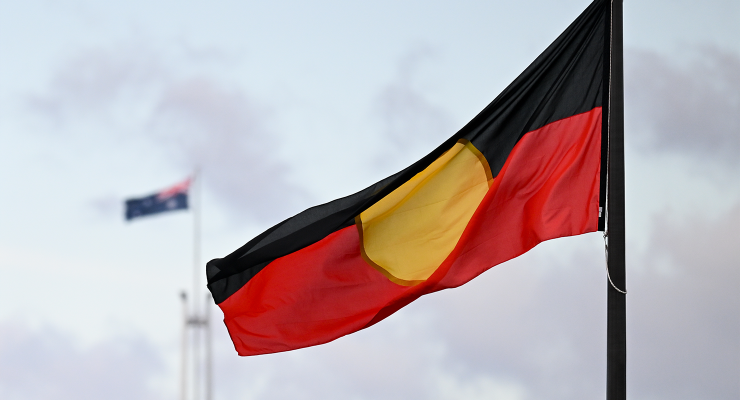
I’m an upbeat person. There’s a lot to be thankful for and a lot to be hopeful about. But being an Aboriginal person in Australia sure requires some seriously thick skin.
As a nation, Australia has found countless ways to essentially say to First Peoples “we don’t respect you, we’re not willing to consider your feelings, or listen to your wants or ideas, and your rights don’t matter to us”.
Last year was particularly bruising for us, but we don’t need a referendum to be reminded of the many attempts to put us in our place — such opportunity rolls through every January when the shallow and toxic political posturing surrounding “Australia Day” arrives.
Okay, some people felt constitutional reform was a complicated issue to grapple with. But it’s harder to believe that they can’t get their heads around the simple question of when is a good time to throw a party?
There shouldn’t be anything complicated about it. You find a suitable date that works for everyone who you want to celebrate with and then you go for it.
If your best friend has something planned that night, you might try to find another date.
Or if, say, that night happens to mark the beginning of a dedicated and persistent attempt to eradicate your friend’s entire family and wipe their culture and language from the face of the earth, then maybe you’d think twice about throwing a party at all.
If you want to celebrate January 26, I certainly won’t be inclined to come along. I’m not going to feel wanted or welcome.
Perhaps that’s your intent.
But if like so many politicians, columnists and radio hosts, you start sentences like “we all want to be inclusive and help close the gap with our Indigenous Australians”, then why wouldn’t you be willing to even consider how we feel or what we want?
You’re either being deceptive or oblivious to the inherent and hurtful contradiction of your position.
It’s not a date to celebrate. The fact that more and more people can recognise this fact is a comfort to me. That businesses are willing to consider and reflect changing public sentiments is a welcome development.
People tell us to “get over it and move on” as they rub salt into our wounds — wounds caused by the very thing they want us to celebrate.
The forcing of our people off our lands, the bloodshed, the ripping apart of our families, the herding of us into settlements and controlling every aspect of our lives may have happened in the past, but the impact of those actions continues to have significant effects today.
We are still living with the unfair disadvantage and harm caused. The racism that underpinned those decisions hasn’t evaporated and harmful decisions are still being made to us.
We all want to get on with creating a better future together, but to do so we need people to be willing to talk with us. To listen to what we have to say. To start to reckon with the brutal unfairness of the past and how it has created conditions that our people are still facing today.
It’s frustrating to watch politicians like Peter Dutton and Pauline Hanson try to whip people into a frenzy about a shop choosing not to stock Australia Day thongs or whatever it was that fewer and fewer people are buying anyway. And it’s infuriating to see them try to pit us against one another.
But there are also politicians who give me hope that things will get better, particularly here in Victoria where we have a government willing to have the difficult conversations that need to be had. One that has invested in a process that ensures we can come together with respect and on equal footing.
The process is called Treaty.
It’s about coming together, recognising our differences, talking about the problems, and agreeing to negotiate ways to make things better.
The journey has been underway in Victoria since 2016. The First Peoples’ Assembly is in its second term — we’ve held two elections where all First Peoples were invited to choose who they want representing them.
You see, we believe that when it comes to Aboriginal communities, the experts are Aboriginal people. That’s why we’ve created a framework that will directly empower Aboriginal communities to implement their own solutions at a local level.
Later this year we’ll sit down with the Victorian government to start negotiating a timetable for transferring the power to make decisions about Aboriginal communities, culture and Country back into Aboriginal hands.
That’s a day I’ll be celebrating.
It will be a day that will mark a new chapter in our history in which First Peoples and newer Australians can come together with respect and discuss how we want to share this great place we all call home.








I’m hoping for smooth sailing in your treaty negotiations and I’ll be watching with interest even though I live in the state to the north. NSW isn’t negotiating a treaty and it’s long past time for one.
I reckon that for all Australians to move forward united we need these things:
Moving forward united as citizens of the Australian republic. We’ll need all that unity in the climate crisis that is developing rapidly.
Sigh. I’ll be in my grave before the first one will even be looked at and rejected. It’s a nice dream.
We should never dump the monarchy
We have the best system in the world.
Why – We have head of State – Monarch – whom we don’t have to pay for – who has no power , just receives letters saying this is what we are doing as a courtesy.
We have the Governor General who is apolitical – appointed by the elected representatives
The GG is symbolic and does as he is told by the Government of the day
his term is limited – there are no elections and is a good rubber stamp + ceremonial duties. [ which the UK has to suffer paying millions for Royalty + hangers on ]
So we have the most economic and representative government.
becoming republic will corrupt this – who will be President? – further election campaigns , no one will accept the outcomes as probably disused politicians will occupy the position- , the civil service entourage , the powers THE ADDED Cost – in effect further disrupt the peaceful present process that actually costs nothing being a monarchy.
Ask our First Nations people about that. It’s the best system in the world for some Australians.
Except that the Monarch’s signature is required to sign off on new laws. An effective veto. No power? Pfffft.
The GG is appointed by the Prime Minister. One person.
Really? I don’t recall this in our constitution.
Whoever the people decide. This is what democracy means.
11 November 1975.
The best system in the world, eh? Tell that to everyone still pissed off about ‘the Dismissal’ – the coup we like to pretend was kosher.
Oh, my God.
Thank you, Reuben Berg, for your well-informed and thought-provoking commentary.
It is indeed frustrating to see the usual suspects frothing at the mouth about a business doing what it chooses to do. Fomenting faux crises, outrages, and divisions seem to be all Conservative politicians are capable of at present. The sad thing is that it seems to work with a large number of people as the recent referendum on The Voice to Parliament clearly shows.
I’ve never been particularly Nationalistic about any country I’ve lived in, so celebrating the National Day is not something I do. On the other hand, I understand that many people enjoy doing so. What I cannot fathom is why the needs and feelings of the indigenous peoples of invaded countries cannot be accommodated with regard to these events – or in Australia, with regard to their own governance. It is to the ongoing shame of Australia that it remains the only post-colonial Commonwealth country that does not have a treaty with its First Nations people, not to mention the initially genocidal (which is STILL not acknowledged) and more lately dismissive and paternalistic attitudes displayed towards them by every Australian Government since the invasion. I sincerely hope that the negotiations in Victoria will become a model for future similar efforts for Australia as a whole, and that as a nation we can repair the damage to our international reputation (not to mention to our collective National psyche) resulting from the failure of The Voice referendum.
A very positive apolitical presented article Rueben.
Tomorrow’s date should not be Australia Day as all that occurred in Sydney Cove was the
birth of a state named ‘New South Wales’. Of course, any moron should know that Australia Day (at this time) should be 1 January. Of course Dutton (& his cronies) is aware of these facts. But all he wants is division not unity for this nation.
Federation was not independence, although there was now a place officially called Australia with a single government. It is also a very inconvenient date.
The best we can do is probably 3 March which is when the Australia Act came into force severing the last legal links to the UK. But of course we still had a Queen of Australia – who was here at the time and proclaimed it.
Not exciting I realise, so maybe we will have to wait until there is an Australian republic, and make sure that comes into effect on an appropriate date.
Misleading rubbish… Internationally, recognised and accepted as Australia, from former colonies, we became a nation acceptable for a national day. If and when we become a fully free nation, with no repressive ties, let us consider that day. I care for no day to celebrate…
Yes but the colonies became one – Australian government. – a Commonwealth
Quite true – but this new Australia was a British dominion. It was certainly the start of becoming a completely independent nation. Prior to this the separate colonies were already self-governing.
Australia Day? It is actually NSW foundation/settlement day. South Australia and Western Australia have clearly different foundation days. Leaving aside whether foundation days should be celebrated, we need a national day all Australians can relate to and be proud of.
More power to you and the First Peoples Assembly, Rueben.
It was the Colonies that made Australia – the aboriginal tribes had nothing to do with it nor changed anything specifically for them or Europeans. – all the change was for the population as a whole at Federation and we have a Peoples Assembly called Commonwealth Parliament.
Go away. I prefer to celebrate and recognise the first inhabitants of this once beautiful and uncorrupted landmass, not the thieving colonisers.